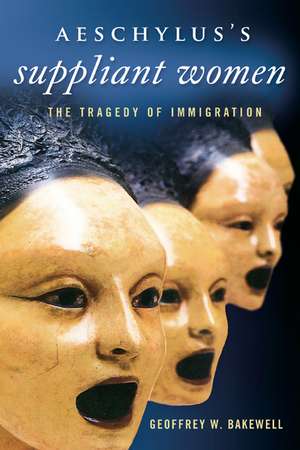Aeschylus’s Suppliant Women: The Tragedy of Immigration: Wisconsin Studies in Classics
Autor Geoffrey W. Bakewellen Limba Engleză Paperback – 15 aug 2013
This book offers a provocative interpretation of a relatively neglected tragedy, Aeschylus's Suppliant Women. Although the play's subject is a venerable myth, it frames the flight of the daughters of Danaus from Egypt to Greece in starkly contemporary terms, emphasizing the encounter between newcomers and natives. Some scholars read Suppliant Women as modeling successful social integration, but Geoffrey W. Bakewell argues that the play demonstrates, above all, the difficulties and dangers noncitizens brought to the polis.
Bakewell's approach is rigorously historical, situating Suppliant Women in the context of the unprecedented immigration that Athens experienced in the sixth and fifth centuries BCE. The flow of foreigners to Attika increased under the Pisistratids but became a flood following liberation, Cleisthenes, and the Persian Wars. As Athenians of the classical era became increasingly aware of their own collective identity, they sought to define themselves and exclude others. They created a formal legal status to designate the free noncitizens living among them, calling them metics and calling their status metoikia. When Aeschylus dramatized the mythical flight of the Danaids from Egypt in his play Suppliant Women, he did so in light of his own time and place. Throughout the play, directly and indirectly, he casts the newcomers as metics and their stay in Greece as metoikia.
Bakewell maps the manifold anxieties that metics created in classical Athens, showing that although citizens benefited from the many immigrants in their midst, they also feared the effects of immigration in political, sexual, and economic realms. Bakewell finds metoikia was a deeply flawed solution to the problem of large-scale immigration. Aeschylus's Argives accepted the Danaids as metics only under duress and as a temporary response to a crisis. Like the historical Athenians, they opted for metoikia because they lacked better alternatives.
Din seria Wisconsin Studies in Classics
-
 Preț: 71.93 lei
Preț: 71.93 lei -
 Preț: 357.07 lei
Preț: 357.07 lei -
 Preț: 160.09 lei
Preț: 160.09 lei -
 Preț: 321.58 lei
Preț: 321.58 lei -
 Preț: 116.93 lei
Preț: 116.93 lei -
 Preț: 58.57 lei
Preț: 58.57 lei -
 Preț: 208.26 lei
Preț: 208.26 lei -
 Preț: 238.93 lei
Preț: 238.93 lei -
 Preț: 322.99 lei
Preț: 322.99 lei -
 Preț: 403.33 lei
Preț: 403.33 lei -
 Preț: 149.95 lei
Preț: 149.95 lei -
 Preț: 66.23 lei
Preț: 66.23 lei -
 Preț: 118.67 lei
Preț: 118.67 lei -
 Preț: 306.60 lei
Preț: 306.60 lei -
 Preț: 229.03 lei
Preț: 229.03 lei -
 Preț: 310.57 lei
Preț: 310.57 lei -
 Preț: 336.39 lei
Preț: 336.39 lei -
 Preț: 258.86 lei
Preț: 258.86 lei -
 Preț: 153.95 lei
Preț: 153.95 lei -
 Preț: 428.40 lei
Preț: 428.40 lei -
 Preț: 429.75 lei
Preț: 429.75 lei -
 Preț: 227.80 lei
Preț: 227.80 lei -
 Preț: 506.04 lei
Preț: 506.04 lei - 15%
 Preț: 478.78 lei
Preț: 478.78 lei -
 Preț: 247.56 lei
Preț: 247.56 lei -
 Preț: 402.76 lei
Preț: 402.76 lei - 15%
 Preț: 476.54 lei
Preț: 476.54 lei -
 Preț: 178.13 lei
Preț: 178.13 lei -
 Preț: 119.03 lei
Preț: 119.03 lei -
 Preț: 166.72 lei
Preț: 166.72 lei -
 Preț: 187.37 lei
Preț: 187.37 lei -
 Preț: 199.67 lei
Preț: 199.67 lei -
 Preț: 218.12 lei
Preț: 218.12 lei - 23%
 Preț: 588.69 lei
Preț: 588.69 lei -
 Preț: 502.03 lei
Preț: 502.03 lei -
 Preț: 347.37 lei
Preț: 347.37 lei -
 Preț: 305.89 lei
Preț: 305.89 lei -
 Preț: 122.89 lei
Preț: 122.89 lei -
 Preț: 506.04 lei
Preț: 506.04 lei - 23%
 Preț: 709.57 lei
Preț: 709.57 lei -
 Preț: 160.48 lei
Preț: 160.48 lei - 23%
 Preț: 608.98 lei
Preț: 608.98 lei -
 Preț: 258.14 lei
Preț: 258.14 lei -
 Preț: 258.25 lei
Preț: 258.25 lei -
 Preț: 213.29 lei
Preț: 213.29 lei - 23%
 Preț: 450.63 lei
Preț: 450.63 lei - 23%
 Preț: 591.20 lei
Preț: 591.20 lei -
 Preț: 246.80 lei
Preț: 246.80 lei
Preț: 257.29 lei
Nou
Puncte Express: 386
Preț estimativ în valută:
49.24€ • 51.09$ • 41.15£
49.24€ • 51.09$ • 41.15£
Carte tipărită la comandă
Livrare economică 17-31 martie
Preluare comenzi: 021 569.72.76
Specificații
ISBN-13: 9780299291747
ISBN-10: 029929174X
Pagini: 226
Ilustrații: 226
Dimensiuni: 152 x 229 x 18 mm
Greutate: 0.32 kg
Ediția:1
Editura: University of Wisconsin Press
Colecția University of Wisconsin Press
Seria Wisconsin Studies in Classics
ISBN-10: 029929174X
Pagini: 226
Ilustrații: 226
Dimensiuni: 152 x 229 x 18 mm
Greutate: 0.32 kg
Ediția:1
Editura: University of Wisconsin Press
Colecția University of Wisconsin Press
Seria Wisconsin Studies in Classics
Recenzii
"Besides being one of our oldest plays, Suppliant Women is the first depiction, in any genre, of what happens when women fleeing sexual violence in their home monarchy seek asylum in a nearby democracy. With his sensitivity to both philological and theatrical issues, his lovely clear style and sober, erudite judgment, Bakewell is an ideal guide through this uncannily resonant 'tragedy of immigration.'"—Jennifer Wise, University of Victoria
Notă biografică
Geoffrey W. Bakewell is professor of Greek and Roman studies and director of the Search for Values in Light of Western History and Religion Program at Rhodes College in Memphis, Tennessee.
Cuprins
Preface
Introduction
1 Charter Myth for Metoikia
2 Spoken Like a Metic
3 The Cypriote Stamp
4 Sons of Earth
Conclusion
Notes
References
IndexDescriere
This book offers a provocative interpretation of a relatively neglected tragedy, Aeschylus's Suppliant Women. Although the play's subject is a venerable myth, it frames the flight of the daughters of Danaus from Egypt to Greece in starkly contemporary terms, emphasizing the encounter between newcomers and natives. Some scholars read Suppliant Women as modeling successful social integration, but Geoffrey W. Bakewell argues that the play demonstrates, above all, the difficulties and dangers noncitizens brought to the polis.
Bakewell's approach is rigorously historical, situating Suppliant Women in the context of the unprecedented immigration that Athens experienced in the sixth and fifth centuries BCE. The flow of foreigners to Attika increased under the Pisistratids but became a flood following liberation, Cleisthenes, and the Persian Wars. As Athenians of the classical era became increasingly aware of their own collective identity, they sought to define themselves and exclude others. They created a formal legal status to designate the free noncitizens living among them, calling them metics and calling their status metoikia. When Aeschylus dramatized the mythical flight of the Danaids from Egypt in his play Suppliant Women, he did so in light of his own time and place. Throughout the play, directly and indirectly, he casts the newcomers as metics and their stay in Greece as metoikia.
Bakewell maps the manifold anxieties that metics created in classical Athens, showing that although citizens benefited from the many immigrants in their midst, they also feared the effects of immigration in political, sexual, and economic realms. Bakewell finds metoikia was a deeply flawed solution to the problem of large-scale immigration. Aeschylus's Argives accepted the Danaids as metics only under duress and as a temporary response to a crisis. Like the historical Athenians, they opted for metoikia because they lacked better alternatives.

















